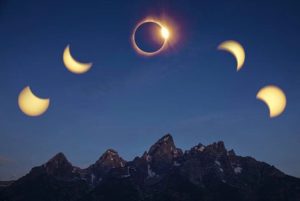
Florida Judge says the trial must go on, despite celestial events.
Judge Merryday denied the United States Attorney’s motion, that “… boldly moves (where no AUSA has moved before) to postpone a trial because an agent of the Bureau of Alcohol, Tobacco, Firearms, and Explosives, has pre-paid the cost of visiting the zone of “totality” of a solar eclipse.” Unimpressed with the motion, and apparently the eclipse itself, the opinion notes, “An eclip
se is just another astral event, precisely predictable since the day the Babylonians discovered the governing formula (although some contend for an earlier discovery).
Here’s the full opinion:
UNITED STATES DISTRICT COURT
MIDDLE DISTRICT OF FLORIDA
TAMPA DIVISION
UNITED STATES OF AMERICA
v. CASE NO. 8:17-cr-266-T-23JSS
JOSEPH BISHOP
____________________________________/
ORDER
Definitely recurrent, sometimes consequential, and occasionally spectacular,
the solar eclipse understandably occupies a provocative and luminous place in
history and in art. For example, Herodotus reports that a solar eclipse during the
war between the Medes and the Lydians caused the combatants, who interpreted the
eclipse as a divine omen, to suspend hostilities and to negotiate peace. In Borodin’s
magnificent opera, an eclipse portends disaster for Prince Igor’s military campaign
against the Polovtsians. In a popular 1970s song, the splendid Carly Simon
introduced the attendance of a former suitor (reportedly the actor Warren Beatty) at
a solar eclipse as probative evidence of his putatively insufferable vanity:
Well I hear you went to Saratoga
And your horse, naturally, won
Then you flew your Learjet up to Nova Scotia
To see the total eclipse of the sun
Well, you’re where you should be all the time
And when you’re not, you’re with some underworld spy
Or the wife of a close friend,
Wife of a close friend, and
You’re so vain
You probably think this song is about you
On a higher plane, Wordsworth wrote about an eclipse in 1820:
High on her speculative tower
Stood Science waiting for the hour
When Sol was destined to endure
That darkening of his radiant face
The solar eclipse is no longer mysterious, supernatural, foreboding, or
ominous (or even “total”; owing to the solar corona, the darkness of a “total” eclipse
is only partial). An eclipse is just another astral event, precisely predictable since the
day the Babylonians discovered the governing formula (although some contend for
an earlier discovery).
On this occasion, an Assistant United States Attorney boldly moves (where no
AUSA has moved before) to postpone a trial because an agent of the Bureau of
Alcohol, Tobacco, Firearms, and Explosives, has pre-paid the cost of visiting the
zone of “totality” of a solar eclipse that will occur on August 21 (about the eclipse,
the motion oddly uses the phrase “scheduled to occur,” as if someone arbitrarily set
the eclipse, as an impresario sets a performer, to appear at a chosen time and place,
subject always to some unstated exigency).* Cruel fate has dictated that the August
21 eclipse will occur during the trial of an action in which the agent is a principal
participant on behalf of the United States.
In any particular month, about four-hundred actions pend before each active
district judge in the Middle District of Florida; each action typically involves several
lawyers, at least two parties, and an array of witnesses. A trial prompts the clerk to
summon scores of potential jurors. The present motion proposes to subordinate the
time and resources of the court, of the opposing counsel, of the witnesses, and of the
jurors to one person’s aspiration to view a “total” solar eclipse for no more than two
minutes and forty-two seconds. To state the issue distinctly is to resolve the issue
decisively.
When an indispensable participant, knowing that a trial is imminent, pre-pays
for some personal indulgence, that participant, in effect, lays in a bet. This time,
unlike Carly Simon’s former suitor, whose “horse, naturally, won,” this bettor’s
horse has — naturally — lost. The motion (Doc. 31) is DENIED.
ORDERED in Tampa, Florida, on August 18, 2017.
- According to the motion of the United States, a total solar eclipse last occurred in June
1918. (Doc. 31 at 2) But total eclipses occur far more frequently than the United States claims; the
National Aeronautics and Space Administration identifies six opportunities in the last decade to
view a total eclipse. Eclipses and Transits, Nat’l Aeronautics & Space Admin., available at
http://www.nasa.gov/eclipse.